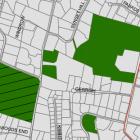Government
Officials to Neighbors Concerned about Proposed ‘Greenway’: ‘There Is No Back Door to Crossing the Wetlands’
|
Concerned that a proposed 3-lot subdivision on Weed Street—and, separately but related, a planned public footpath that’s part of what open space advocates envision for the site—could negatively impact wetlands and aesthetics in the area, neighbors on Monday night urged officials at a public hearing to proceed carefully with approvals. Strictly speaking, the only proposal before the Inland Wetlands Commission now is for a moderately expanded driveway into the 9-acre lot just north of the intersection at Wahackme (and on the east side of Weed), beneath which new utility lines would be installed, for the two additional lots. That said, the overall site plan—which will require its own applications and hearings—calls for subdivision of the lot , as well as a conservation easement for a strip of land that open space advocates including the New Canaan Land Trust would like to use in order to create a new walk-able trail from the Nature Center to Weed Street in the area of Irwin Park. One neighbor on Weed Street, Dan Radman, told the commission during Monday’s hearing that he wanted “to be sure that if there is an approval to make, it is not the domino effect that it is already the first stepping stone into ‘understood subdivision’ and ‘understood pathway,’ which it should not be.”
Commission Secretary George Blauvelt assured him: “There is no back door into crossing the wetlands.”
“When they [members of the Land Trust] get to a point where they are actually ready to begin the approval process, they will have to come back to this commission and they will have to submit plans,” Blauvelt said at the public hearing, held in the Sturgess Room at the New Canaan Nature Center. “And the public will be invited to hear them and they will have to make their case as to why, if in fact their plans require crossing wetlands, why it would be a good thing, and it would be another opportunity for everyone to take a look.”
Ultimately, the commission decided not to take action on the driveway application, for two main reasons.
